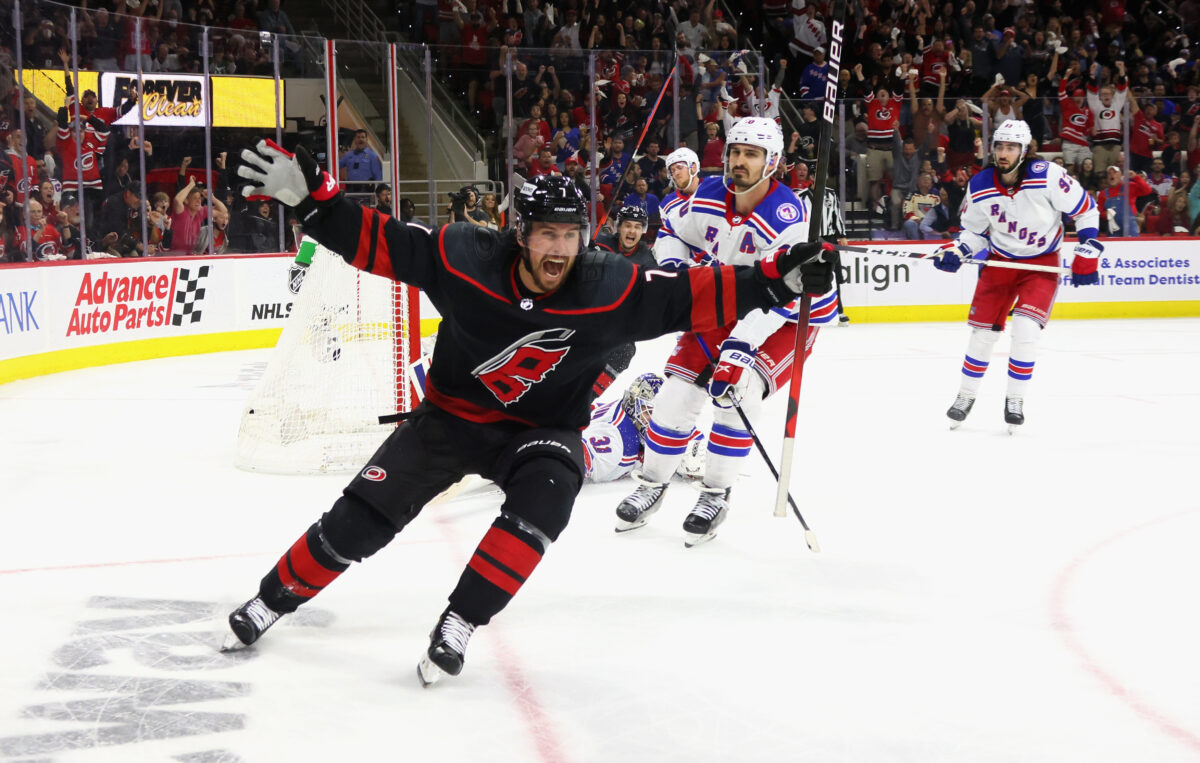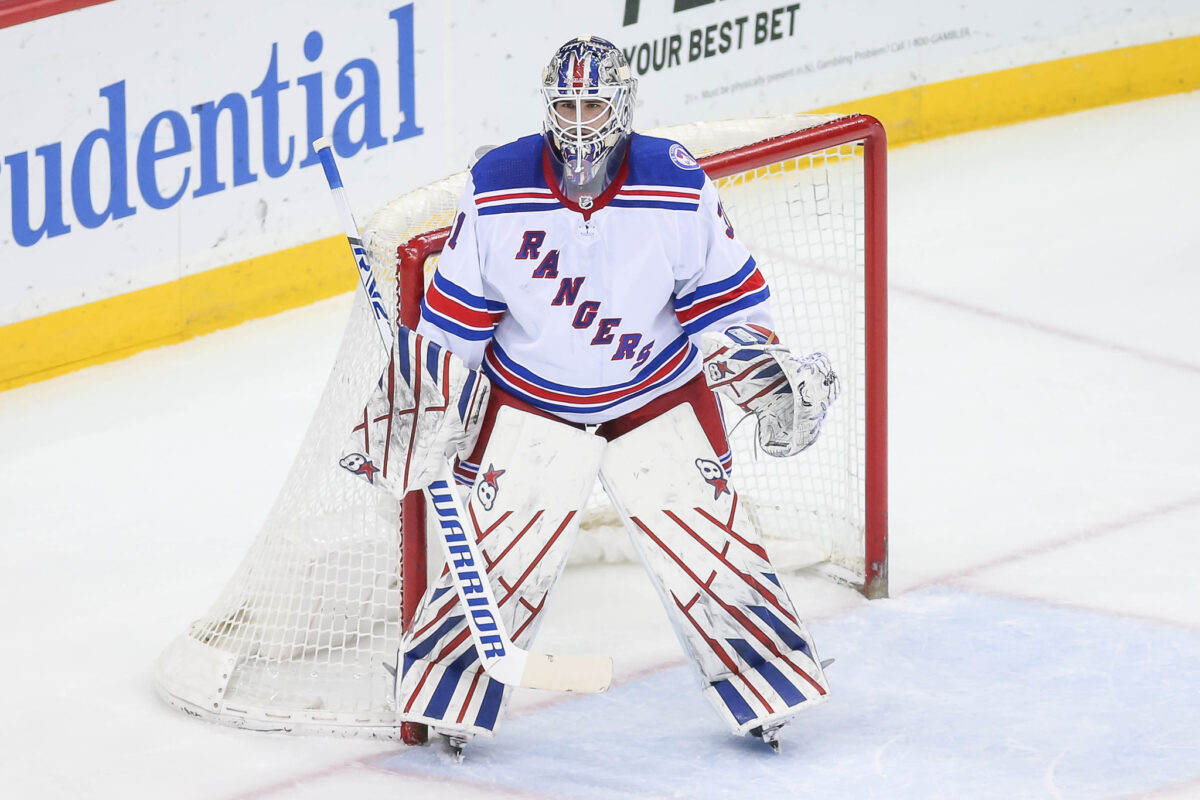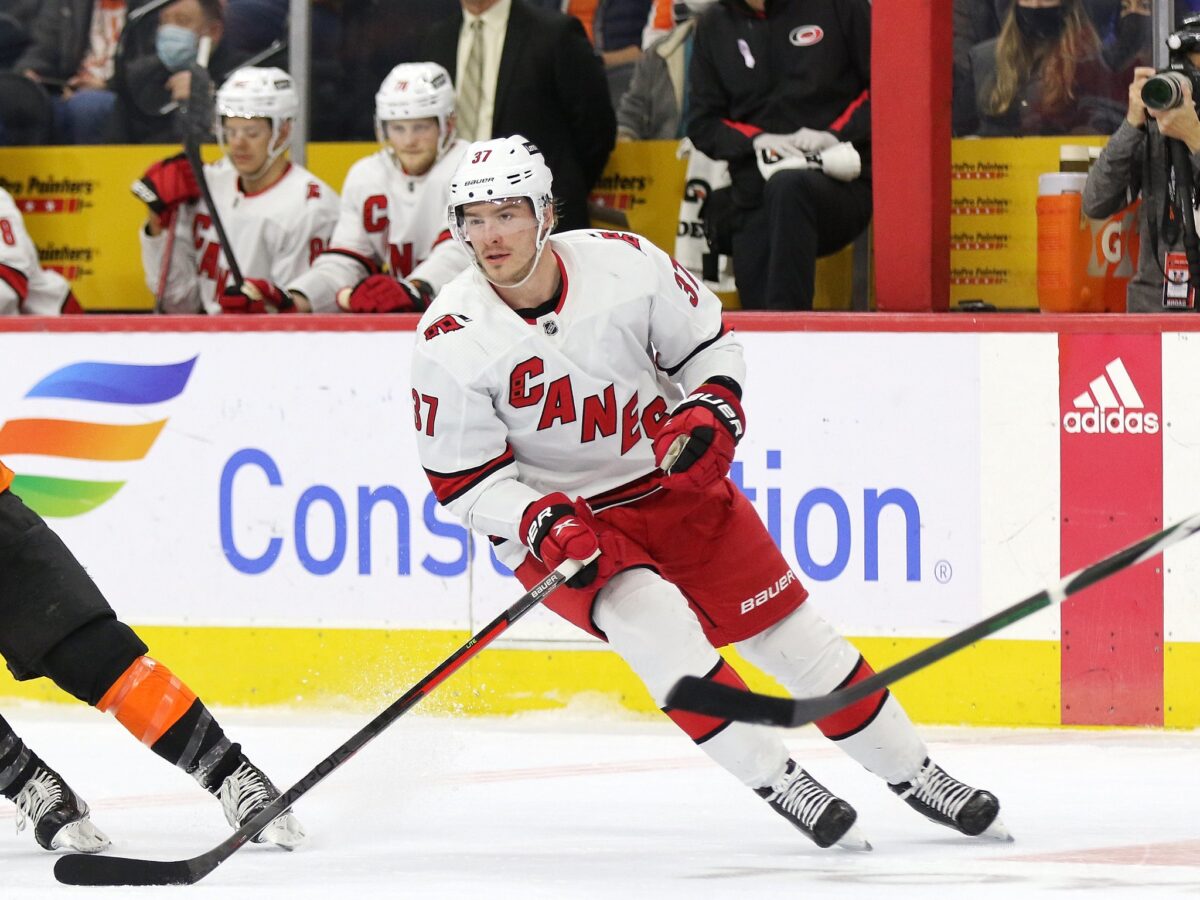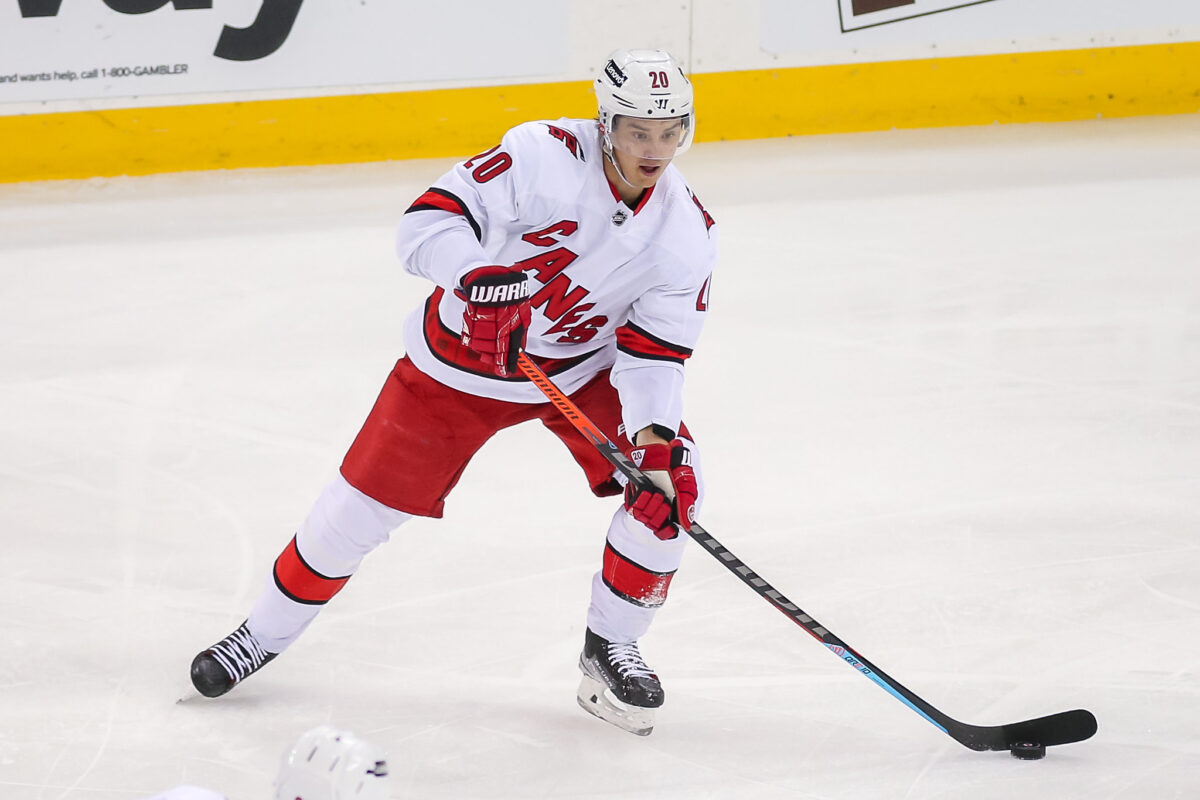When a series moves to 3-0, it is usually over; just three times in the history of the NHL has a team come back from an 0-3 series deficit in the playoffs. Knowing how competitive this postseason has been to this point, it was probably unrealistic to expect the Carolina Hurricanes to go into Madison Square Garden and get this second-round series to that count. There’s too much talent throughout the New York Rangers roster, and that Igor Shesterkin guy they have between the pipes is a pretty good goalie.
With that said, though, and knowing the Rangers would give a hearty effort in a must-win game, there’s a whole lot to like about the Hurricanes’ road game on Sunday afternoon. Games 1 and 2 were an impressive display of goalie play and team defense, respectively, with Carolina allowing just one goal in 123 minutes of hockey played at PNC Arena. Sunday saw some of the same, as the Rangers were rarely able to generate a ton of offense despite head coach Gerard Gallant having the ability to pick matchups for the first time in the series (and, therefore, get Mika Zibanejad and Chris Kreider away from Jordan Staal‘s line. Of course, those two went on to score their team’s two non-empty-net goals). Despite a desperate opponent, the Hurricanes dominated long stretches of play and out-shot the Rangers by a 44-33 margin.
Sometimes elite goalies are going to steal games, and Shesterkin certainly did in this one. Per Natural Stat Trick, the heavy favorite for this year’s Vezina Trophy stopped 3.51 goals above expected (GSAx), which is probably the key storyline in this one (well, one of the two; we’ll talk about the other soon enough). That number is all the more impressive when you consider that the one goal he did allow, a seemingly harmless backhander from Nino Niederreiter off the rush, probably didn’t help that statistic much. Hockey is funny sometimes, right? The guy was unbelievable on high-danger chances, but the one goal he did allow basically went right through him on a shot he saw all the way. In his defense, the backhander is the toughest shot to track in hockey because of its unpredictability coming off the blade, but still.

Despite the loss, the Hurricanes surely enter Game 4 feeling good about their game. They still have home-ice advantage and a 2-1 series lead, and they just played their best road game of the four they’ve played in the postseason (low bar, in fairness). If the upward trend continues, there’s a great chance they get that evasive first road win on Tuesday night, back on Broadway.
A few concerning trends have nevertheless popped up that provide a reason for pause, so today we’re going to do a takeaway-style check-in on where the team has come up short, and how they will need to improve in order to stick around in the playoffs for a while longer. The way they defend, kill penalties, and largely dominate play at five-on-five should give you faith that this team is a legitimate threat to take home the Stanley Cup this season. If they don’t shore up a few key areas, though, they could very well be going home earlier than they all suggest they “should”.
Hurricanes’ Power Play Must be a Momentum-Earner
This is getting to be annoying (and repetitive) to talk about at this point, but it’s impossible to have watched Game 3 and not start right here. The Hurricanes got off to about as good of a road start as a team can in the first, peppering Shesterkin and the Rangers with a 13-3 shot advantage under halfway through the opening period. They had some great looks, were hemming them in, and simply did everything but score. This included a power play, the one that was by far their best of the day. The puck movement was pretty crisp, and a few good shots got through to the net – though, again, nothing to show on the scoreboard, which is important. This is a results-based business, and as “good” as it looked, it still fell short. The Hurricanes are 9 for their last 93 on the power play, a stat that dates back to the regular season.
Shortly thereafter, the Rangers’ own power play got a chance, and, although it looked significantly worse early on against the Hurricanes’ elite penalty kill (in the regular season, anyway, it’s been average at best against the Boston Bruins and Rangers) with multiple clears and little zone time, they were able to make a quick play on a seam pass from Artemi Panarin to Zibanejad, and, boom; just like that, they’re trailing. The Canes didn’t capitalize, the Rangers did, and in what was effectively a one-goal game, it’s pretty easy to summarize the story of Game 3 right here.
Related: Hurricanes’ Kochetkov: From KHL Goalie to Stanley Cup Playoffs Starter
In cringeworthy bookend fashion, though, the Hurricanes’ power play gave the team one more gut-punch in the third period. Brett Pesce drew a slash with right around six minutes remaining in a 2-1 game, and the opportunity ahead of them was obvious. ONE competent power play and they could steal the win – for the second time in three games in this series, and if they could have tied it and used that momentum to get the game-winner, they effectively put the series on ice. Only, the Hurricanes barely possessed the puck in the offensive zone, and when they did, they were too slow with their puck movement and the lack of urgency was shocking.
Not to downplay the Rangers’ penalty killing and overall team defense with so many blocked shots throughout the game, but I’m pretty sure some beer league teams could have killed it off with how stationary and ineffective the power play was – the first unit especially. It looked like they were overthinking things and the lack of success has gotten in their head a little bit, and the hesitancy and poor passing is just making the power play go from bad to worse. Speaking of causation, the remaining four minutes were nothing short of demoralizing. It was like the power play sapped all the remaining energy from the team, and Tyler Motte’s empty netter from inside his own blue line almost felt like mercy after Teuvo Teravainen‘s fanned pass (about the fifth one in this three-or-four-minute span, by the way) went right onto his tape.
It doesn’t have to be perfect. It doesn’t have to hit at a 40 percent clip or score multiple times every game. It just can’t be, well… whatever you want to call what fans saw in Game 3. Heck, it could still be a net positive if they don’t score another goal the rest of the playoffs. The Hurricanes must use these man advantages to start possessing the puck and create chances and gain momentum off of them. If it continues to have such a negative impact for the Hurricanes, it could easily boost the Rangers and their own highly-dangerous power play to the Eastern Conference Final in their place. Not to get ahead of myself, but let’s not even mention the possibility of seeing the Tampa Bay Lightning in the next round, since it’s known what that power play is capable of. This is the biggest area of concern for the Hurricanes right now if you ask me.
Letting Shesterkin “Feel It”
Plenty of discourse about the play of Shesterkin has occurred over the last couple of weeks. After a monstrous regular season with a 36-13-4 record, 2.07 goals-against average (GAA), and an incredible .935 save percentage (SV%), he had some struggles in the first round against the Pittsburgh Penguins, allowing fewer than three goals just once in the seven games. That included back-to-back games in which he was pulled, where he allowed 10 goals on just 45 shots. However, the great ones bounce back quickly. Largely thanks to the belief from his teammates and coaches, he was able to do so with a vengeance, ripping off three straight wins to complete the series comeback in the opening round (from “The Rangers’ Goalie Is Adjusting to the Pressures of the Playoffs”, The New York Times, 5/17/22).
One of the keys for the Hurricanes was getting to him early in this series, and not allowing him to settle in and get back to being the same guy he was in the regular season (during which, incidentally, the Hurricanes largely made him look human in their two games against him, scoring four goals on 36 shots on Apr. 26 and three goals on 24 shots on Apr. 12, both Carolina wins). Unfortunately, this mission has probably not been accomplished so far, and it has a lot to do with an offense that simply isn’t clicking right now.
Even in the two home-ice wins, the forward corps was pretty far down the list of reasons why they won; Antti Raanta was utterly sensational in Game 1 until the team was able to finally find its game in the third period, and the team defense was as dominant as you’ll see in a playoff game in Game 2. Somewhat quietly, though (until Game 3, anyway, which was pretty damn loud), Shesterkin is sitting with four goals allowed in three games and has a stellar .956 SV%. If he was struggling, that’s gone now – he, once again, looks like potentially the best goalie in the world.

The Hurricanes haven’t made his life difficult enough, and, if they don’t find a way to do so, they could be in big trouble moving forward. Many-a-hot goalie have carried a lesser team to series wins, and the gap between these teams isn’t huge anyway. Shesterkin is going to save anything he can see, and there have been times throughout the year where the Hurricanes didn’t get to the front of the net to make things ugly. That’s how you score on elite goalies, and how you score in the playoffs. They’re playing an elite goalie in the playoffs, but they’re not doing what it takes to earn those goals. There have also been far too many extra passes, such as when Martin Necas and Andrei Svechnikov both drove to the high slot, then passed up an open shot to… pass back to the blue line. Both times, the defenseman’s shot got blocked.
This “trying to do too much” style is especially frustrating considering the fashion the one goal they scored in Game 3 came in. Niederreiter didn’t try to curl and find a trailer or look to the back door for a cross-ice pass and one-timer. He threw the puck on net, and, lo and behold, he got a goal out of it. The playoffs are often about simplifying. Get shots on goal (ON NET, not into the defenseman’s shin pads after taking three seconds to shoot after catching a pass), get to the crease, get deflections, bang in rebounds. Shesterkin’s life has been far too easy in the series so far, but they can change the narrative right back with a spirited effort in Game 4. It’s time for Carolina’s high-compete, interior-oriented players like Svechnikov, Vincent Trocheck, Seth Jarvis, Staal, and Niederreiter to shine, and get him right back off his game.
Hurricanes’ Stars Must at Least Battle New York’s to a Draw
Really, this goes hand in hand with what we talked about in the last two sections, but it is worth another section all the same. We already touched on Zibanejad and Kreider having something of a breakout game. The Hurricanes have to hope that it was mostly a one-off because those two guys getting hot could cause major problems for any team – especially in tandem with a hot Shesterkin. Meanwhile, the Hurricanes’ heroes in their last three wins? Max Domi, Ian Cole, and Brendan Smith (though Sebastian Aho deserves consideration in the last case when in Game 2 he had that beautiful, shorthanded primary assist to Smith and the empty netter that sealed the deal just before the clock hit zero). At some point, the stars need to show up and start to lead this team, because New York’s began doing so in Game 3.
Now, the bright side to this is that the Hurricanes don’t need to be unequivocally carried by their top guys. Aho is liable to break out and get hot at any moment anyway, but it would be well and good if he could, hypothetically, save that for the next two rounds. All the team really needs from he, Teravainen, and Jarvis is to effectively draw even with the New York big guns because the depth beyond those guys is more than capable of washing out the Rangers’.
Incidentally, while they’re certainly still not at their best, there was a lot to like about the games from Svechnikov and even Necas in Game 3. Svechnikov hit the post early on and was simply much more noticeable and decisive with the puck on his stick. He also had some very physical shifts, which is normally a sign that he’s feeling it. It’s been a bit surprising to see the 22-year-old Russian struggle as much as he has, especially considering how built-for-this-style he is as a fast, skilled, power forward. The Hurricanes will benefit enormously if this game was something he builds off of, and they start to see the 30-goal scorer contribute more offense as the postseason progresses.

A player who is not really built for this style, meanwhile, is Necas. This entire season has really been a struggle for the Czech winger, especially frustrating that it came in a contract year where everyone hoped for a big step forward. While there continues to be flashes, there are still far too many instances where he takes too long to make a play, or simply makes an awful read and it forces something into a turnover (it seems like a lack of confidence, knowing how skilled and dangerous he is when on his game). Still, the upside is tremendous for these two players, on opposite wings flanking Trocheck, who has largely had a good run so far in the playoffs. The Rangers’ second line (like most of their offense) has been pretty quiet, so, if this line can start to click like they’re capable of, they could have issues matching them.
Finally, (and I know we’re leaving out the Staal line here, and it can’t be understated how good they’ve been, but plenty has been written about that already), the fourth line quite possibly had their best game of the postseason, too. Jesperi Kotkaniemi is fighting the puck a bit and had multiple chances where he seemed to hesitate and took too long taking a shot or making a play, but overall the line was noticeably good in Game 3; all three members were at least plus-10 in Corsi; Kotkaniemi at 16 shot attempts for and six against, Domi at 14 for and four against, and Steven Lorentz at 15 for and three against.
Those guys really bring the energy and offer a little skill, too, although I wouldn’t be surprised to see Derek Stepan or Jordan Martinook (or both) check back in in the near future. No matter how you slice it, the Hurricanes have five high-end fourth liners, and, especially with how well they fit in the system, offer a potential mismatch against the opposition’s bottom-six lines. That’s a nice luxury to have in your back pocket, and one reason head coach Rod Brind’Amour should feel comfortable not having to over-play his top guys as the grind of the postseason continues. But, in short, it comes down to the point of this section – Aho, Svechnikov, and the other Carolina stars needing to at least make it a close fight with Zibanejad, Kreider, Panarin, and so on in this series. If that happens, the rest could very easily work out in the Hurricanes’ favor.
Hurricanes Have Been Here Before
Now, this post isn’t meant to be negative or scare Hurricanes fans, or say that the team isn’t going to win this series. The likelihood of a sweep here was extremely slim, and going up 3-0 would have effectively ended it. It only just got underway, and it may well go six, if not seven – therein lies the rub with the 2022 Playoffs, especially in the Eastern Conference, with so many legitimately great teams; there is no easy path. Still, something in my gut tells me that a spirited effort is on the docket in Game 4, and if they pull that off, the Hurricanes could very well move on in five. I probably wouldn’t put money on it, though.
The biggest reason for hope is that the Hurricanes are now the ones who have been here before. In recent years, it felt like they were still the young pup trying to find their way. It takes time to learn how to win in the playoffs, and the Hurricanes have had four years to learn that lesson now, leading to this current run. They simply ran into the experienced, talented Bruins teams of yesteryear, and then the Lightning as well. Which, incidentally, if you don’t believe the point I’m making now, simply look at the other Eastern Conference Semifinal. The two-time defending champs are running the fresh-faced Presidents’ Trophy winner out of the building and seemingly their season.

The Rangers, in many ways, remind me of the Hurricanes of recent years. They do have the elite goaltender that Carolina really didn’t, which gives them a little more leash, but they’re a talented team on the rise that is still figuring it out with many of their young players. So, fans of the Blueshirts should take a lot of solace in that if this series doesn’t go their way; there is a very bright future in that organization, and this experience will only make them better – heck, teams often learn more from their losses than their wins. If not now, then I fully expect them to be a serious factor in the playoffs for a long time coming.
The Hurricanes can still take a stranglehold on the series if they can find a way to get it done on Tuesday. The next step is to make it a point to develop a killer instinct after grabbing those 2-0 leads, and not let their opponent get life again in the series like Boston did. Anything can happen this time of year, and the last thing they want is to go into Games 6 and (especially) 7 trying to close out a team with belief and face a goalie as good as Shesterkin in a winner-take-all scenario. The Hurricanes can take some solace, though, knowing they’re in good shape in the series, needing just two wins in four games, while they haven’t come close to playing their best hockey yet.
This has been a fun matchup already, and, with the way the teams started to get chippy at the end of Game 3, we may have some explosiveness due up next. Buckle up, folks, as the fireworks in this Eastern Conference Semifinal have only just begun.
